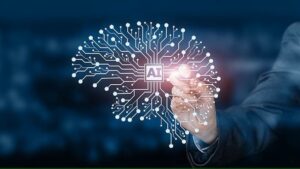
Artificial Intelligence Algorithms
AI algorithms follow a set of instructions in calculations or other operations. This applies to both mathematics and computer science. So, at the essential level, an AI algorithm is the programming that tells the computer how to learn to operate on its own.
How They are Transforming Healthcare and Medicine:
Artificial Intelligence, AI Algorithms rapidly transform the healthcare and medical industries. With the help of machine learning and predictive analytics, doctors and researchers can now diagnose diseases more accurately, develop personalized treatment plans, and predict potential health risks with greater precision than ever before. The power of Artificial Intelligence algorithms lies in their ability to process vast amounts of data quickly and accurately, enabling medical professionals to make more informed decisions and deliver better patient care. From gene sequencing to drug discovery, Artificial Intelligence is revolutionizing how we approach healthcare and medicine. Further, this article will explore the latest advancements in AI technology, how they transform the healthcare industry, and this exciting new frontier’s potential benefits and challenges.
How AI algorithms are transforming diagnosis and treatment:
One of the most significant ways Artificial Intelligence algorithms transform healthcare is by improving the accuracy of diagnosis and treatment. Artificial Intelligence algorithms can identify patterns and correlations that human physicians may miss by analyzing large amounts of data from electronic health records (EHRs) and medical imaging. For example, Artificial Intelligence algorithms can analyze medical images to detect the early signs of cancer or other diseases, allowing doctors to develop treatment plans more quickly and accurately.
Artificial Intelligence algorithms actively transform diagnosis and treatment through personalized medicine. They analyze a patient’s medical history and genetic makeup to provide insights on the most effective treatments for individuals. This personalized approach improves patient outcomes and reduces the risk of adverse reactions. Furthermore, healthcare providers can proactively predict potential health risks with the help of AI algorithms. By analyzing data from wearable devices, these algorithms detect patterns indicating potential health issues, enabling timely intervention before the condition worsens.
Benefits of using AI algorithms in healthcare:
The benefits of using Artificial Intelligence algorithms in healthcare are vast. In large data, AI algorithms can help doctors and researchers make more informed decisions, leading to better patient outcomes. Some of the specific benefits of using AI algorithms in healthcare include:
### Improved accuracy of diagnosis and treatment:
Artificial Intelligence algorithms can analyze large amounts of data to identify patterns and correlations that human physicians may miss. This improved accuracy can lead to more accurate diagnoses and effective treatment plans.
### Personalized medicine:
By analyzing a patient’s medical history and genetic makeup, AI algorithms can provide insights into which treatments may be most effective for that individual. This personalized approach to medicine can improve patient outcomes and reduce the risk of adverse reactions to therapies.
### Predictive analytics:
Artificial Intelligence algorithms can help healthcare providers to predict potential health risks, allowing them to intervene before a patient becomes seriously ill. Further, this can lead to improved patient outcomes and reduced healthcare costs.
### Improved efficiency:
By automating routine tasks and providing real-time insights, Artificial Intelligence algorithms can improve the efficiency of healthcare providers. Further, this can lead to faster diagnoses, reduced wait times, and improved patient satisfaction.
Examples of AI algorithms in healthcare:
Many healthcare professionals today use Artificial Intelligence algorithms in various applications. Some of the most exciting models include:
### Medical imaging analysis:
Healthcare professionals actively use AI algorithms to analyze medical images, such as X-rays and MRIs, in order to detect early signs of cancer or other diseases. Further, this can help doctors to develop treatment plans more quickly and accurately.
### Personalized medicine:
Artificial Intelligence algorithms can analyze a patient’s medical history and genetic makeup to provide insights into which treatments may be most effective for that individual. This personalized approach to medicine can lead to improved patient outcomes and reduced healthcare costs.
### Predictive analytics:
Artificial Intelligence algorithms can analyze data from wearable devices to predict potential health risks, allowing healthcare providers to intervene before a patient becomes seriously ill.
### Drug discovery:
Artificial Intelligence algorithms can analyze large data sets to identify potential drug candidates, reducing the time and cost of drug discovery.
Ethical concerns surrounding Artificial Intelligence Algorithms in Healthcare:
While the benefits of using Artificial Intelligence algorithms in healthcare are vast, ethical considerations must be addressed. Some of the most significant ethical concerns include:
### Privacy:
Artificial Intelligence algorithms actively transform healthcare by enabling personalized medicine through the analysis of patient medical history and genetics. However, these algorithms require access to large amounts of data to be effective. While this data may include sensitive information like medical records and genetic data, healthcare providers must prioritize patient privacy and ensure that data is only used for legitimate healthcare purposes.
### Bias:
Artificial Intelligence algorithms actively transform healthcare by enabling personalized medicine through the analysis of patient medical history and genetics. However, it’s important to note that AI algorithms are only as unbiased as the data they are trained on. If the data used to train an algorithm is biased, there is a risk of perpetuating that bias within the algorithm’s outcomes. Therefore, healthcare providers must prioritize training AI algorithms on unbiased data to avoid perpetuating existing biases in the healthcare system.
### Accountability:
As AI algorithms become more prevalent in healthcare, there is a risk that accountability for decisions made by these algorithms may become diffuse. It is essential that healthcare providers take responsibility for the decisions made by AI algorithms and ensure that they are transparent about how these decisions are made.
The future of Artificial Intelligence algorithms in healthcare:
The future of Artificial Intelligence algorithms in healthcare is bright. As the technology continues to evolve, we can expect to see even more significant advancements in the healthcare industry. Some of the most exciting developments include:
### Improved accuracy of diagnosis and treatment:
As AI algorithms become more advanced, we expect to see more accurate diagnoses and effective treatment plans.
### Personalized medicine:
AI algorithms will continue to provide insights into which treatments may be most effective for individual patients, improving patient outcomes and reducing healthcare costs.
### Predictive analytics:
As wearable technology becomes more prevalent, we can expect to see even more advanced predictive analytics, allowing healthcare providers to intervene before a patient becomes seriously ill.
### Drug discovery:
AI algorithms will continue to play an essential role in drug discovery, reducing the time and cost of developing new drugs.
Challenges to implementing AI algorithms in healthcare:
While the potential benefits of using AI algorithms in healthcare are vast, there are also significant challenges to implementing this technology. Some of the most important challenges include:
### Data quality:
AI algorithms require access to high-quality data to be effective. Healthcare providers must ensure that the data used to train AI algorithms is accurate and up-to-date.
### Integration with existing systems:
Integrating Artificial Intelligence algorithms with existing healthcare systems can be challenging. Healthcare providers must ensure that AI algorithms are compatible with existing systems and do not disrupt healthcare providers’ workflow.
### Regulation:
As AI algorithms become more prevalent in healthcare, there is a need for clear regulations to ensure that these algorithms are used safely and ethically.
How healthcare professionals can prepare for the rise of AI algorithms:
Healthcare professionals must prepare for the rise of Artificial Intelligence algorithms by staying up-to-date with the latest developments in the field. This includes:
### Continuing education:
Healthcare professionals must continue educating themselves on the latest developments in AI technology and how it is used in healthcare.
### Collaboration:
Healthcare professionals must collaborate with data scientists and other experts to ensure that Artificial Intelligence algorithms are being used safely and effectively.
### Ethical considerations:
Healthcare professionals must be aware of the ethical considerations surrounding the use of AI algorithms in healthcare and ensure that these algorithms are being used in a way that is consistent with their moral obligations.
The Impact of AI Algorithms on healthcare costs:
While the initial cost of implementing AI algorithms in healthcare may be significant, the long-term impact on healthcare costs could be significant. By improving the accuracy of diagnosis and treatment, reducing the risk of adverse reactions to medicines, and predicting potential health risks, AI algorithms can improve patient outcomes and reduce healthcare costs.
Conclusion:
AI algorithms are transforming the healthcare industry, providing access to large sets of data and insights that were previously unavailable. By improving the accuracy of diagnosis and treatment, providing personalized medicine, predicting potential health risks, and improving efficiency, AI algorithms have the potential to revolutionize the healthcare industry. While there are significant challenges to implementing this technology, healthcare professionals must prepare for the rise of AI algorithms by staying up-to-date with the latest developments in the field, collaborating with experts, and being mindful of ethical considerations. The future of healthcare is bright, and AI algorithms will play a significant role in shaping that future.

Pingback: AI Bias and Discrimination
Pingback: Artificial Intelligence and Data Visualization
Pingback: AI Scope In Pakistan